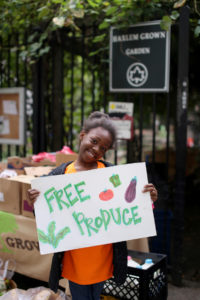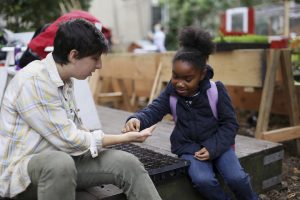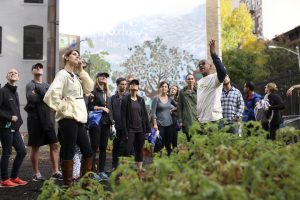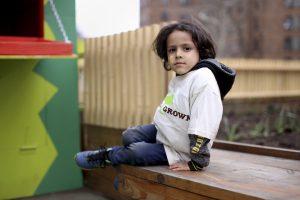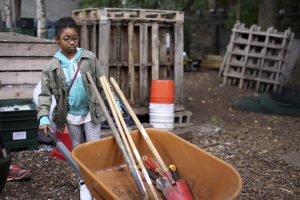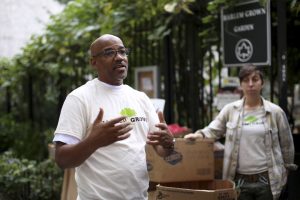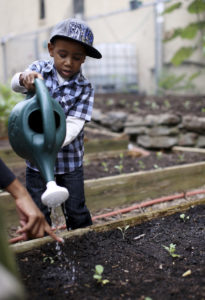
Up the street from the Apollo Theater, a lot on West 134th Street was once home to prowling neighborhood cats, abandoned engine parts and men playing dominos. With the vision of founder Tony Hillery, the kids of Harlem Grown’s youth farm, a truckload of soil from Home Depot and 400 strawberry plants, the makeshift junkyard has been a blooming Eden since 2011. Now, an arbor casts a low ceiling of leafy shade and a sign warns with a wink that, “Trespassers will be composted.”
The mission of this urban youth farm has never been rootbound. While lessons in nutrition and agriculture happen over hydroponics, and conversations about economic, social and food justice unfold between the garden rows, Harlem Grown is also connecting schoolchildren with professional mentors, internships and career connections.
“We’re trying to use the farms and food as a vehicle to inspire change beyond the plate,” says development director Vanessa Vincent. “We’ve been able to connect our youth to opportunities beyond their wildest dreams.”
It’s a natural next step for city-based corporations that come to Harlem Grown’s farms for their own team-building and service projects. After a recent visit from members of the human resources staff of the New York Times, a group of 13 middle schoolers were invited to visit the paper of record’s offices on 42nd Street. Out of that visit, a summer internship opportunity for one impressive, well-prepared student began to blossom.
“She was asking questions that were really well thought-out and beyond her years,” says Vincent. “For someone who is in middle school—not even high school—to have that opportunity and exposure to the top journalists and news publication, it’s an opportunity that wouldn’t have been available had it not been for the connections we’re able to make on our farm.”
Over spring break, a group of students got to flip out on a tour of Google’s offices, but Harlem Grown is also fostering one-one-one mentoring relationships. Juice Generation is a strong supporter of Harlem Grown’s programming and the sponsor of the new two-story greenhouse being constructed on 127th Street. Through conversations at the annual Christmas party and on the farm, CEO and founder Eric Helms has come to know the kids and wanted to offer a one-on-one day of mentorship.

“When we approached Gorgy he was like, ‘What? Huh?’ It’s so far from what they understand or expect in their day-to-day life,” Vincent says. “It’s so awesome to have that one-on-one opportunity to shadow a CEO of a business that’s thriving in New York. It really opened his eyes at 12 to really understand what it means to be an entrepreneur.”
That’s what it’s like to be a kid involved with Harlem Grown. One day you’re talking about sustainability on 134th Street, the next day you’re the only 14-year-old speaking on a panel about sustainability in cities at the United Nations.
“I felt a little awkward because I was the youngest person there,” says Kadidjatou “Kadi” Ba, who was recently invited to convene with international UN representatives and higher-ups at the New York City Department of Parks and Recreation. Vincent says Ba discovered she was a natural and impassioned speaker, not only about the importance of urban farming as a vehicle for good nutrition and healthy eating but about the systemic factors that make access to healthy food a political issue.

“She was able to put it in the context of why it’s important for Harlem Grown to exist—what it means for her community, why it’s so hard to find healthy food in the area, the lack of resources that she and her family and the people that she knows have to face every day,” says Vincent. “It was awesome to see her speak about it in a social, economic way that people wouldn’t expect a freshman in high school to be able to do.”
Ba earned a standing ovation that day, and has gone on to give keynote addresses with Tony Hillery and appear on ABC. This summer, Ba plans to work on her burgeoning tea business that she started with help from the Harlem Grown team. She’s not sure yet what the future may hold in terms of a career farther down the road—she is a freshman in high school, after all—but she knows that Harlem Grown has opened her eyes to the way agriculture touches everyone’s daily life, even in the concrete jungle of New York City.

As for herself, Vincent says: “It’s gotten me to try to want to live sustainably, so just doing basic tasks at home, like recycling or composting. Agriculture will always influence me to do things like that even if I don’t pursue a career in agriculture, those will be things I do because of my knowledge.”
“We want to capture whatever spark the children have and try to nurture it, even if it’s well outside the realm of agriculture,” Vincent says.
Besides, she adds, what blooms in the beds at 134th Street is transferable to offices downtown.
“When you’re growing your own food, there’s a certain level of confidence that grows in you.”



